(!)NOTE : Windows 7 users won’t be able to use some latest features of eCatalog/WOS since Microsoft is ending support for Windows 7 on 14 Jan, 2020. Please upgrade your system for uninterrupted services.
- Notice of End of Sales for Economy Series Pneumatic Equipment Category. More information.
Bearings with Housings(Bearing Type:Needle Roller Bearing with Thrust Ball Bearings)
Bearings with Housings are essential components used to support shaft movement with precision in both radial and axial directions. They find widespread application across various industries, such as automation systems, food and pharmaceutical industries, and electronics industries. When selecting Bearings wi
Bearings with Housings are essential components used to support shaft movement with precision in both radial and axial directions. They find widespread application across various industries, such as automation systems, food and pharmaceutical industries, and electronics industries. When selecting Bearings with Housings, it is crucial to consider factors such as Bearing Inner Diameter, Bearing Type, Flange Shape, Number of Bearings, and Material of Bearing and Housing. These considerations are vital for ensuring the production of high-quality products. We highly recommend reputable brands like MISUMI and KONISHI, as well as cost-effective options from MISUMI ECONOMY.
Take advantage of the convenience of FREE SHIPPING and NO MINIMUM ORDER on Bearings with Housings. If you have any doubts or require assistance in choosing the right product, our experts are readily available to provide advice and guidance.
|
Main Body Shape
|
|
|---|---|
Brand |
|
| CAD |
|
| Days to Ship |
|
1 items
- Sort By
-
You can add up to 6 items per a category to the compare list.
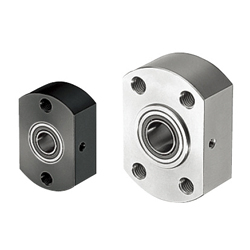
Bearings with Housings - Thrust Bearings
MISUMI
Bearings with Housings - Thrust Bearings
Bearings with housings are commonly used in various industrial applications and providing a mounting structure. They offer a wide variety of sizes to choose from.
[Feature]
● Bearing Inner Diameter Minimum/Maximum (mm.): 7 and 30
● Bearing Used : Needle Roller Bearing with Thrust Ball Bearings
● Shape : Standard and Pilot
● Material :
Bearing - SUJ2 Equivalent
Housing - S45C Equivalent and SUS304
[Application]
Bearings with housings are commonly used in automation machines system- Volume Discount
Main Body Shape Bearing Inner Dia. d(mm) Bearing Type Number of Bearings Flange Shape Bearing Material Housing Material Retaining Ring Surface Treatment Type Mount Type Flanged 7 ~ 30 Needle Roller Bearing with Thrust Ball Bearings Single - Steel S45C / SUS304 Not Provided Black Oxide / Electroless Nickel Plating / Not Provided Bearing with Housings - From: ₹ 4,042.10 Days to Ship: 9 Day(s)  9 Day(s)
9 Day(s)
| Brand |
|---|
| Product Series |
| CAD |
| From |
| Days to Ship |
| Main Body Shape |
| Bearing Inner Dia. d(mm) |
| Bearing Type |
| Number of Bearings |
| Flange Shape |
| Bearing Material |
| Housing Material |
| Retaining Ring |
| Surface Treatment |
| Type |
| Mount Type |
You can add up to 6 items per a category to the compare list. | |
| Brand | MISUMI |
| Product Series | |
| CAD |
|
| From | ₹ 4,042.10 |
| Days to Ship | 9 Day(s) |
| Main Body Shape | Flanged |
| Bearing Inner Dia. d(mm) | 7 ~ 30 |
| Bearing Type | Needle Roller Bearing with Thrust Ball Bearings |
| Number of Bearings | Single |
| Flange Shape | - |
| Bearing Material | Steel |
| Housing Material | S45C / SUS304 |
| Retaining Ring | Not Provided |
| Surface Treatment | Black Oxide / Electroless Nickel Plating / Not Provided |
| Type | Bearing with Housings |
| Mount Type | - |
Loading...
Configure
Specification/Dimensions
-
Bearing Inner Dia. d(mm)
-
Bearing Type
- Deep Groove Ball Bearing
- Needle Roller Bearing with Thrust Ball Bearings
- Angular Contact Bearing, Back-to-Back Combination
-
Number of Bearings
- Single
- Double
-
Flange Shape
- Round Type
- Square Type
- Compact Type
-
Bearing Material
- Steel
- Stainless Steel
-
Housing Material
- S45C
- SUS304
- A2017
-
Retaining Ring
- Not Provided
- Provided
-
Surface Treatment
-
Type
-
Mount Type
Related Categories to Bearings with Housings
FAQ Bearings with Housings
- Question: What is the purpose of Retaining rings?
- Answer: To prevent the falling of bearing.
If no retaining ring, it is necessary to use some separate part to hold the bearing. - Question: What are the main components of bearings with housing?
- Answer: Bearings with housing typically consist of three main components: the bearing itself, the housing, and the sealing mechanism. The bearing is the rotating component that supports the shaft, while the housing encloses the bearing and provides a mounting surface. The sealing mechanism helps prevent contamination and retains lubrication within the assembly.
- Question: Do you offer shipping of disassembling bearings and retaining rings?
- Answer: Yes.
Please input alterations code "NA" for disassembling of bearing and retaining ring. They will be shipping as attachment. - Question: What types of bearings are commonly used with housing?
- Answer: Bearings with housing are available with various types of bearings, including:
Ball bearings
Roller bearings (such as cylindrical, spherical, and tapered roller bearings)
Sleeve bearings (plain bearings) - Question: Can I order the holder part separately?
- Answer: Yes.
Please see more details in item not listed in MISUMI FA Catalog service.
It is necessary to request for quotation as item not listed in MISUMI FA Catalog service. - Question: How do I choose the right bearings with housings for my application?
- Answer: 1. Analyze Application Requirements: Understand load capacity, speed, and environmental conditions.
2. Calculate Load and Speed Ratings: Determine maximum radial and axial loads and required RPM.
3. Select Bearing Type: Choose the appropriate type (e.g., ball, roller) based on application characteristics.
4. Consider Housing Material: Select a suitable material for housing based on environmental factors.
5. Ensure Proper Fits: Match bearing dimensions accurately with the shaft and housing.
6. Sealing and Lubrication: Decide between sealed or open bearings and the appropriate lubrication method.
7. Account for Misalignment: Use self-aligning bearings if needed.
8. Evaluate Mounting and Installation: Consider ease of installation and any additional components required.
9. Prioritize Reliability: Opt for high-quality bearings from reputable manufacturers.
10. Seek Expert Advice: Consult with bearing experts or manufacturers if uncertain about the best choice. - Question: What are the different types of bearings with housings available?
- Answer: There are several different types of bearings with housings available, each designed to suit various applications. Some common types include:
1. Pillow Block Bearings (Plummer Blocks): These are the most common type of mounted bearings. They consist of a housing (usually made of cast iron or stainless steel) and a self-aligning ball or spherical roller bearing. Pillow block bearings are widely used in conveyor systems, agricultural machinery, and industrial applications.
2. Flange Bearings: Flange bearings have a flanged housing that allows them to be mounted to a surface. They are commonly used in applications where space is limited or where the bearing needs to be fixed in a specific position, such as in electric motors or appliances.
3. Take-up Bearings: Take-up bearings are designed to compensate for shaft misalignment and belt stretch in conveyor systems and tensioners. They have an adjustable housing that can move along the frame to accommodate changes in tension.
4. Hanger Bearings: Hanger bearings are used to support shafts in conveyors, especially in troughing applications. They consist of a split housing with a bearing insert. - Question: What are the key factors to consider when installing a bearing with housing?
- Answer: Key factors to consider when installing a bearing with housing:
1. Proper Alignment: Ensure accurate alignment between the bearing, shaft, and housing to avoid excessive loads and premature wear.
2. Correct Fits: Use the right shaft and housing fits to prevent looseness or binding, which can impact bearing performance.
3. Cleanliness: Maintain a clean environment during installation to prevent contamination and damage to bearing components.
4. Lubrication: Apply the recommended lubricant in the appropriate amount to ensure smooth operation and extend bearing life.
5. Tightening Torque: Use the manufacturer's specified torque when securing the bearing in the housing to avoid over-tightening or insufficient clamping force.
6. Sealing Integrity: Check and verify that seals are properly installed to protect against contaminants and retain lubrication.
7. Temperature Control: Ensure the bearing is at ambient temperature during installation to avoid thermal expansion issues.
8. Inspection: Perform a visual and functional inspection after installation to confirm everything is in place and functioning correctly. - Question: How do I properly maintain and lubricate a bearing with housing?
- Answer: Proper maintenance and lubrication of a bearing with housing:
1. Regular Inspection: Conduct periodic visual inspections for signs of wear, damage, or contamination.
2. Lubrication Schedule: Follow the manufacturer's recommended lubrication schedule for the specific bearing type and application.
3. Appropriate Lubricant: Use the correct lubricant type and grade as specified by the manufacturer.
4. Clean Environment: Ensure a clean environment during lubrication to prevent contamination.
5. Quantity Control: Apply the right amount of lubricant, avoiding over-greasing or under-greasing.
6. Re-lubrication Frequency: Determine the optimal re-lubrication frequency based on operating conditions and bearing type.
7. Sealing Integrity: Verify that seals are in good condition to retain lubricant and protect against contaminants.
8. Purge Old Lubricant: Remove old or contaminated lubricant before applying fresh lubricant.
9. Temperature Considerations: Account for temperature fluctuations and use appropriate temperature-rated lubricants.
10. Document Maintenance: Maintain a detailed maintenance record to track lubrication intervals and any issues observed during inspections. - Question: What are the common issues or problems with housing bearings and how can I troubleshoot them?
- Answer: Common issues with housing bearings and troubleshooting:
1.Excessive Noise/Vibration: Check for misalignment, inadequate lubrication, or damaged components. Realign, lubricate, or replace bearings if needed.
2.Overheating: Insufficient lubrication, high loads, or improper fits can cause overheating. Verify lubrication, load, and fit, and adjust as necessary.
3.Premature Wear: Incorrect fits, inadequate lubrication, or contamination can cause premature wear. Confirm proper fits, lubrication, and cleanliness.
4.Leaking Grease: Check for damaged seals or over-greasing. Replace seals or adjust lubrication quantity accordingly.
5.Looseness: Verify proper fits and tighten mounting bolts to eliminate looseness.
6.Rust and Corrosion: Address environmental factors causing rust and corrosion. Consider using corrosion-resistant bearings or protective coatings.
7.Abnormal Friction: Investigate for contamination, improper lubrication, or damaged components. Clean, re-lubricate, or replace as needed.
8.Uneven Load Distribution: Assess load distribution on the bearing and housing. Adjust load distribution or use additional bearings if required.
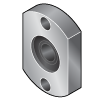
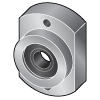
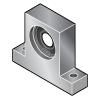


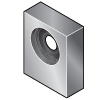






How can we improve?
How can we improve?
Thank you for your time.
Your feedback is essential for our continuous improvement
Privacy Policy
Thank you for your cooperation.
Thank you for your time.
Your feedback is essential for our continuous improvement
Please use the inquiry form.
Privacy Policy